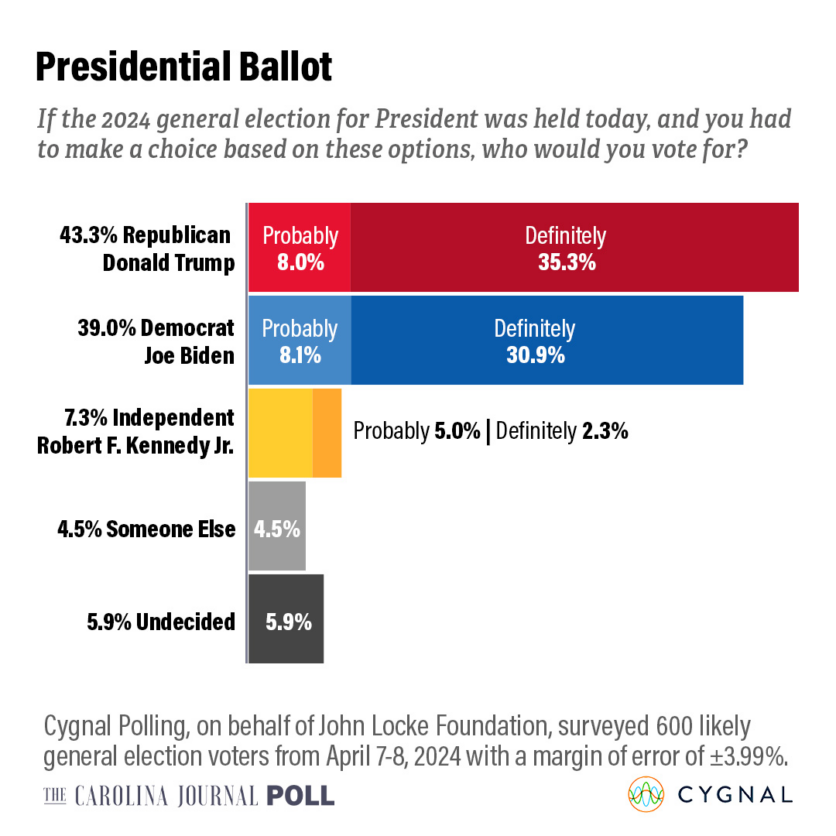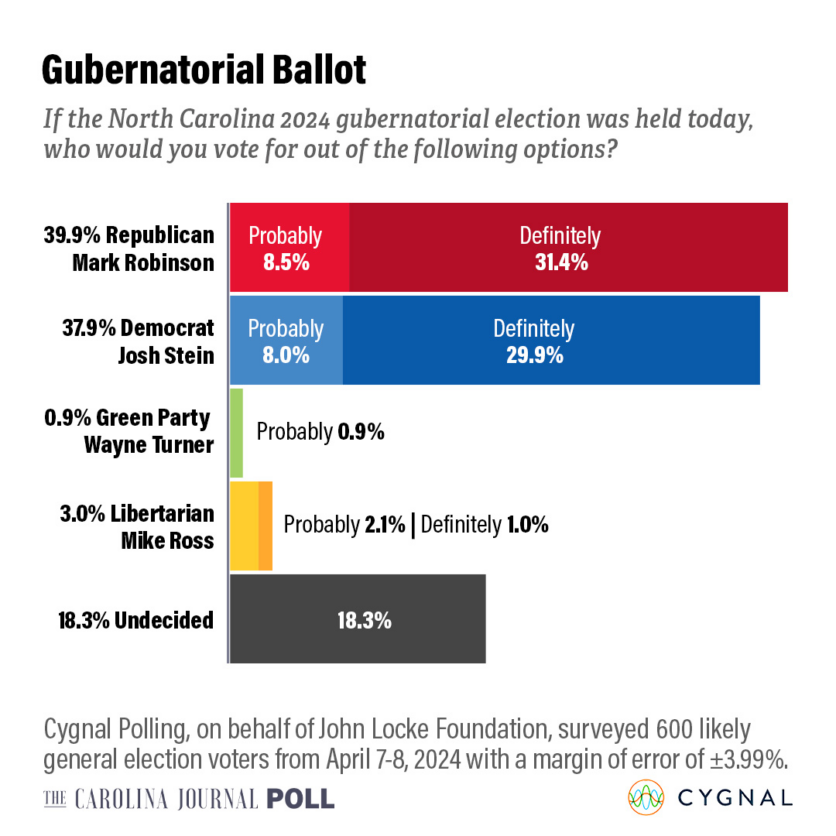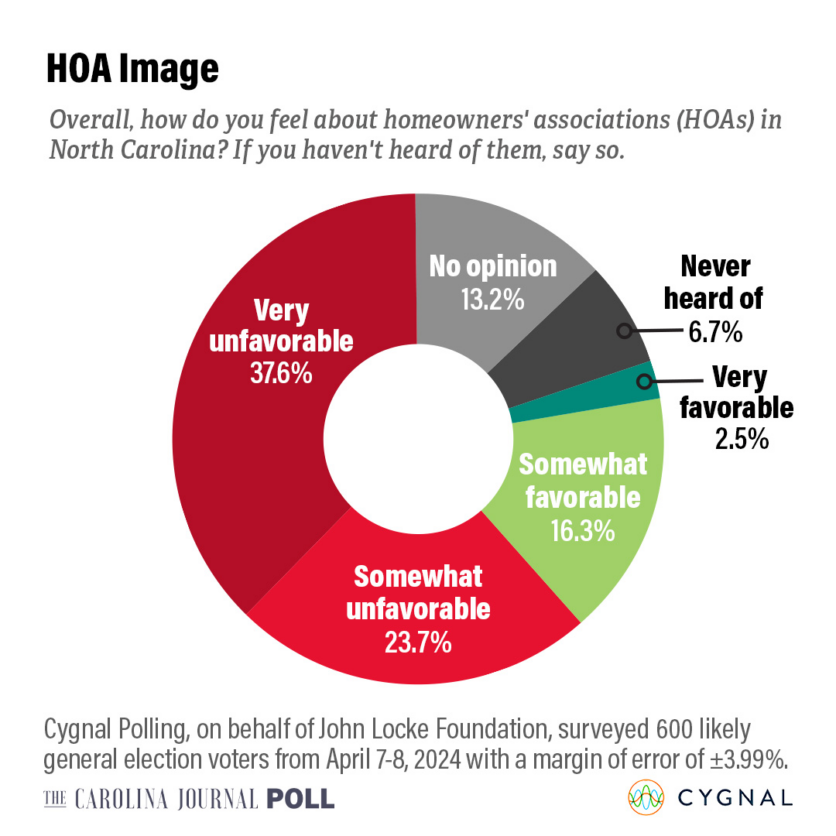April 11, 2024
RALEIGH – Ballot-wide, Republican candidates in North Carolina are seeing a squeeze this month, as the party’s leads are narrowing across the board. A plurality of likely North Carolina voters (43.4%) said they intend to vote for Former President Donald Trump, and 39% said they intend to vote for sitting President Joe Biden – a 4.3-point lead, down from 5.2 points last month. Independent candidate Robert F. Kennedy Jr. has the support of 7.3% of voters. Another 4.5% of voters said they plan to vote for “someone else,” and 5.9% remain undecided. Young voters are showing a noteworthy affinity for Kennedy Jr, with nearly 1-in-5 voters aged 18-35 supporting his candidacy. Men are twice as likely to vote for Kennedy Jr. than women.
Republican gubernatorial candidate Mark Robinson saw a reduction in his lead this month, as well. His support dipped to 39.9%, with his main competitor, Democratic candidate Josh Stein, garnering 37.9% support. This is a marked decline from March when Robinson was up by five points. Both Green Party candidate Wayne Turner and Libertarian Party candidate Mike Ross saw slight increases in support, with Turner at 0.9% and Ross at 3%. This race still has many undecided voters (18.3%).
“Third-party candidates are seeing an increase in popularity this cycle,” said Carolina Journal publisher and John Locke Foundation CEO Donald Bryson. “Only time will tell if this trend continues.”
The GOP saw slight declines in their showing for the generic congressional and state legislative races. A plurality of 46.3% of voters said they intend to vote for a Republican congressional candidate, while 42.1% of voters said they intend to vote for a Democratic candidate. Nearly 12% of voters were unsure. The GOP had slightly better showings for the state legislature, with 47.8% support for Republicans and 42.1% support for Democrats. Around 10% of voters were unsure.
Most North Carolinians continue to believe that America is on the “wrong track” (64.3%), with only 27.2% saying the nation is on the “right track.” President Biden’s approval ratings are similarly underwater. Only 34.6% of voters approve of the job he is doing in office, and 56.7% disapprove. Governor Roy Cooper continues to have a higher approval rating than the president, with 44.2% approval, and 37.9% disapproval.
Voters have indicated that inflation is still impacting their wallets, with an overwhelming 80.7% of voters claiming they are spending more on groceries than they were a year ago. The impact of higher prices is highly correlated with voters’ sentiment about the direction of the country, with 93% of likely voters who believe the country is headed in the “wrong direction” stating they are paying more for groceries.
While the cost of necessities continues to go up for most, many likely voters are spending less on recreational expenses. A plurality of 43.3% of North Carolinians said they will be spending less on travel this year. Around a third of voters said their plans will not change, and 15.3% said they plan to spend more on travel this year.
“Inflation is still a major issue for voters,” Bryson continued. “Despite inflation slowing down, the damage is done. Families will likely never again see the grocery prices of the past. Decreased inflation does not equal decreased prices.”
One thing most voters agree they will not spend any money on, however, is sports betting. Over 77% of likely voters say they have never placed a sports bet and never intend to do so. Sports betting is least appealing to older women, with 88% of women 65+ stating they have not, nor intend to place a bet. It is most appealing to men under 50. One-third of men under 50 either already have or intend to place a bet on sports.
Homeowners associations (HOAs) similarly were found to be quite unpopular. More than 60% of voters have unfavorable opinions of HOAs, and less than 20% view them favorably. The elderly and high earners are the most likely to show support for HOAs, with those who are over 65 and make over $100K/year being 48% likely to view these associations favorably. Three-fourths of North Carolinians said they would like to see more recourse options, outside of litigation, for homeowners to resolve disputes with their HOA. Less than 5% of voters oppose more recourse options.
A majority of voters do, however, support the state’s Opportunity Scholarship Program. Three-fifths of voters support the program, and less than a quarter oppose it. This year, due to an expansion in eligibility, the program has seen a 500% increase in applicants. Current funding levels for the program will not be enough to grant scholarships to everyone who applied. When asked if the General Assembly should increase the funding of this program, a plurality of 41.1% said yes, 15.7% said to keep finding levels the same, and 19.7% said they do not support the program. A significant share of voters (23.1%) are unsure about expanding funding for this program.
On the matter of education, most voters do not believe students should be able to have their phones in the classroom. Nearly 65% of voters said smartphones should not be allowed in the classroom, with less than a quarter of participants thinking they should be allowed. Younger voters are more likely to believe students should be allowed to have their phones, with nearly half of those in the 18-34 age range believing phones should be allowed, while less than 10% of voters 65+ agree.
The legislative “short” session begins this month. When asked if legislators’ $13,951 annual salary was adequate, 57.1% of voters indicated they believe lawmakers are paid enough. However, if lawmakers’ pay does not increase, 51.2% of North Carolinians believe the number of days in the legislative sessions should be capped. On both matters, a significant portion of voters are unsure (24.5% and 22.4%, respectively). A plurality of 48.5% believe legislators’ salaries should not be raised.


